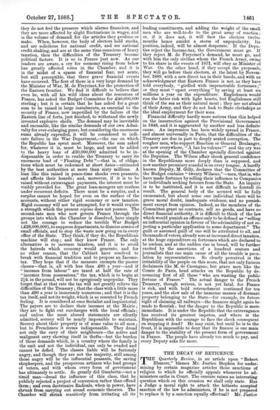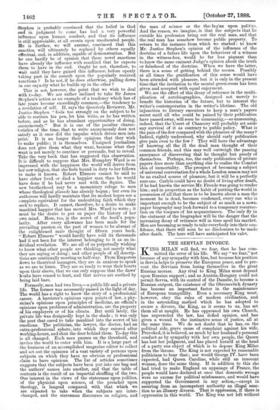tali DECAY OF RETICENCE.
Quarterly Review, in an article upon "Robert Elsmere," blames Mr. Justice Stephen for under- mining by certain magazine articles those sanctions of religion to which he officially appeals whenever he ad- ministers oaths in Court. The censure raises an interesting question which on this occasion we shall only state. Has a Judge a moral right to attack the hitherto accepted sanction of the law he administers, if he is not prepared to replace it by a sanction equally effectual? Mr. Justice Stephen is probably convinced that the belief in God and in judgment to come has had a very powerful influence upon human conduct, and that its influence is still appreciable, at all events upon uneducated people. He is further, we will assume, convinced that this sanction will ultimately be replaced by others equally effectual, and, in addition, capable of demonstration. But he can hardly be of opinion that these novel sanctions have already the influence with mankind that he expects them to have in the end. Ought he not, therefore, to wait until they have gained this influence, before openly taking part in the assault upon the popularly received sanctions ? Is he not, if he does otherwise, pulling down in one capacity what he builds up in the other ?
This is not, however, the point that we wish to deal with to-day. We are rather inclined to take Sir James Stephen's action as an example of a tendency which has of late years become exceedingly common,—the tendency to a revelation of self. If, says the Quarterly Reviewer, Mr. Justice Stephen "feels too strongly on the subject to be able to restrain his pen, let him write, as he has written before, and as he has abundant opportunities of doing, anonymously." But it is one of the peculiar charac- teristics of the time, that to write anonymously does not satisfy as it once did the impulse which drives men into print. It is no longer their opinions that they wish to make public ; it is themselves. Unsigned journalism does not give them what they want, because what they want is not merely to convince or persuade, but to reveal. Take the very book that has suggested this observation. It is difficult to suppose that Mrs. Humphry Ward is so impressed with the happiness the world will derive from her new religion, that she feels bound in duty to her fellows to make it known. Robert Elsmere cannot be said to have either lived or died a happier man than he would have done if he had never met with the Squire. The new brotherhood may be a momentary refuge to men whose theological glissade has already begun; but even its authoress will hardly maintain that its modest hopes are a complete equivalent for the undoubting faith which they seek to replace. It cannot, therefore, be a desire to make mankind happier that has moved Mrs. Ward to write ; it must be the desire to put on paper the history of her own mind. Here, too, is the secret of the book's popu- larity. After every allowance has been made for the prevailing passion on the part of women to be abreast of the enlightened male thought of fifteen years back, Robert Elsmere " would hardly have sold its thousands had it not been for the interest belonging to it as an in- dividual revelation. We are all of us perpetually wishing to know what other people are thinking, not merely what they are saying or doing ; and other people of all descrip- tions are continually meeting us half-way. From Emperors down to theatrical managers, they are as anxious to speak as we are to listen. They are so ready to wear their hearts upon their sleeve, that we can only suppose that the daws' batiks have ceased to hurt, and that nerves are soothed by being laid bare.
Formerly, men had two lives,—a public life and a private life. The former was necessarily passed in the light of day. The world has a right to know the story of a professional career. A barrister's opinions upon points of law, a phy- sician's opinions upon principles of medicine, an official's opinions upon problems of administration, are the property of his employers or of his clients. But until lately, the private life was designedly kept in the shade ; it was only the poet that cared. to take mankind into the secret of his emotions. The politician, the lawyer, the doctor, had an extra-professional sphere, into which they entered after working-hours, and shut the door behind them. To-day this is all changed. Each man pauses on the threshold, and invites the world to enter with' him. It is a large part of the business of an accomplished magazine editor to collect and set out the opinions of a vast variety of persons upon subjects on which they have no obvious or professional claim to have opinions. The list of articles sometimes suggests that the subjects have been put into one bag and the authors' names into another, and that the table of contents is the result of an impartial shuffling of the two. Our interest in the views of the statesman upon politics, of the physicist upon science, of the preacher upon theology, is languid compared with that which we are expected to take when the subjects are inter- changed, and the statesman discourses on religion, and the man of science or the theclogian upon politfc And the reason, we imagine, is that the subjects that lie outside his profession bring out the real man, and that the real man has somehow become public property. To return to the instance from which we started : to know Mr. Justice Stephen's opinion of the influence of the doctrine of a future life upon the behaviour of a witness in the witness-box, would be far less piquant than to know the same eminent Judge's opinion about the truth or falsehood of the doctrine. When we have the latter, there is a sense of getting behind the scenes. Possibly at all times the gratification of this sense would have been attended with pleasure, but it is only in the present time that the invitation to the mental green-room has been given and accepted with equal enjoyment.
We see the effect of this decay of reticence in the multi- plication of autobiographies, designed not merely to benefit the historian of the future, but to interest the writer's contemporaries in the writer's lifetime. The old injunction to literary executors to keep a man's papers secret until all who could be pained by their publication have passed away, will soon be unmeaning,—so unmeaning, indeed, that the Court of Chancery will probably set aside any survival of it as contrary to public policy. What is the pain of the few compared with the pleasure of the many ? Indeed, rightly understood, why should early publication give pain even to the few ? They will have the advantage of knowing all the ill the dead man thought of their common friends, and this may well outweigh the passing annoyance of discovering that he thought but poorly of themselves. Perhaps, too, the early publication of private papers does more than anything else to realise the Comtist idea of immortality. The prospect of becoming a subject of universal conversation for a whole London season may net be an exalted source of pleasure, but it will be a perfectly sure one. Carlyle could have no doubt of living after death, if he had known the service Mr. Fronde was going to render him ; and in proportion as the habit of putting the world in possession of all that there is to be known about a man the moment he is dead, becomes confirmed, every one who is important enough to be the subject of so much as a news- paper biography may look forward to a temporary resurrec- tion on the tongues of his acquaintances. The only fly in the ointment of the biographer will be the danger that the increasing decay of reticence will in time spoil his market. Men are becoming so ready to take everybody into their con- fidence, that there will soon be no disclosures to be made after death. The hero will have anticipated his valet.







































 Previous page
Previous page